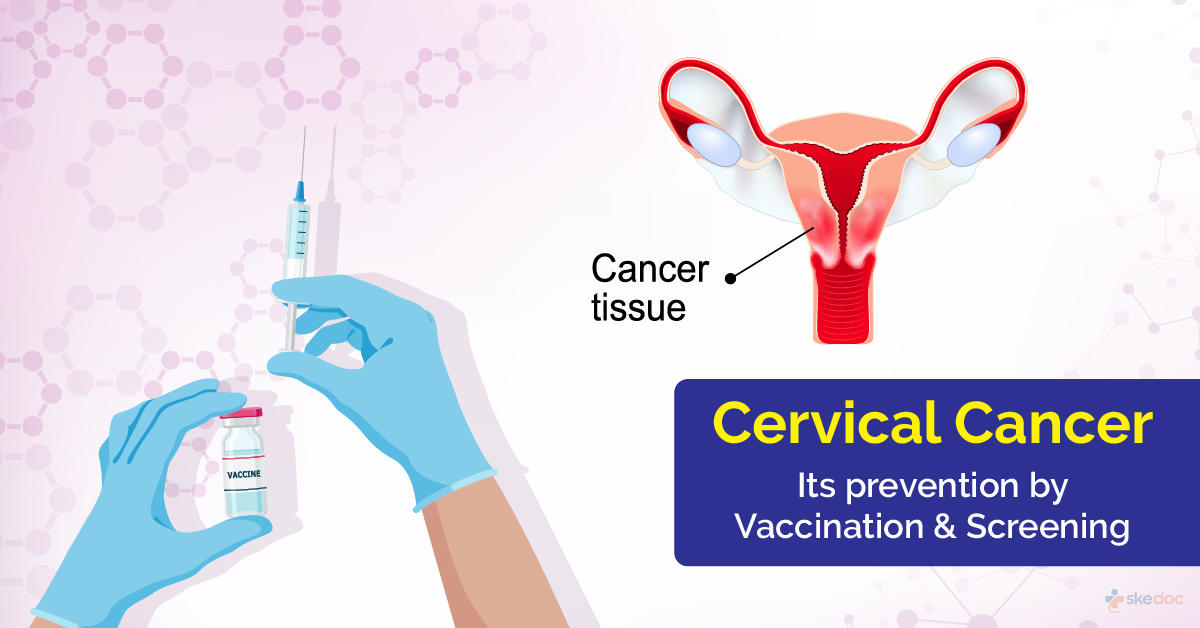Allergy
Blood Diseases
Bone & Joints
Brain
Cancer
Child Care
Cosmetic Surgery
Diabetes
Endocrinology
ENT
Eye
Gen Medicine
General Surgery
Heart
Kidney
Lifestyle
Liver & Digestive
Lung
Men’s Health
Mental health
Physiotherapy
Rheumatology
Skin and hair
Sleep Disorders
Spine
Transplant
Women Health
Thyroid
Vascular Surgery
Cervical Cancer : Its Prevention by Vaccination and Screening

Introduction
Cervical cancer is one of the leading causes of death among women in India. It is one of the most common gynecological malignancies. The majority of Indian women with cancer cervix are in advanced stages as the symptoms appear very late and also most of the women have never undergone any screening before. Cervical cancer can be prevented by vaccination and screening.
Cervical cancer is caused by HPV (Human Papilloma Virus) and it is mainly transmitted through sexual activity and sometimes through skin to skin. Majority of women get rid of HPV infection naturally but in very small percentage of women the infection will persist and can cause precancerous changes in cells which will lead to cancer cervix after almost 10 years if not treated. Screening tests can detect these precancerous and cancerous changes and helps us to take treatment early.
There are many strains of HPV villus of which only a few can cause cancer cervix like HPV 16, 18, 31, 33, etc and genital warts can be caused by strains like HPV 6 X 11. HPV vaccine can protect against the major strains of HPV, which cause cancer cervix and genital warts.
Risk Factors for Cancer Cervix
- Multiple Sexual Partners
- Low socioeconomic Status
- Smoking
- Early age at first intercourse (< 18 Years )
- Immunodeficiency conditions
Cervical Cancer Screening
Cervical cancer screening should be started from 25 years of age, irrespective of sexual activity, and it should be continued till 65 years of age.
-
Pap Smear Test : In this method, we collect cervical cells from both the ecto cervix and endo cervix, With the help of a spatula and brush, and check these cells for any changes caused by HPV. Through this, we can find precancerous and cancerous cells and also if there is any infection or inflammation.
-
HPV Testing : In this method also we collect cells from the cervix and check whether there are any cancer causing HPV strain present in cells or not.
-
HPV and Pap Smear Cotesting
Cervical Cancer Vaccination
WHO recommends vaccination at the of 9 - 13 years. It should be taken before the onset of sexual activity but can be used up to 45 years of age although the effect might be little less. These vaccines give 100% protection against genital wart and 70% protection against cancer cervix if taken before sexual intercourse.
Types of Vaccines :
-
CERVARIX: It is bivalent vaccine and is protective against 2 strains of HPV types 16 and 18 which cause about 70% of cervical cancer. It should be given as 3 doses ( 0 , 1 month,and 6 months ) .If less than 15 years age, only 2 doses are sufficient.
-
GARDASIL: This is a quadrivalent vaccine and is protective against 4 strains of HPV types 6, 11, 16 and 18. It has added advantage of protection against genital wart. It should be given in 3 doses ( 0, 2 months, and 6 months ) If less than 15 years, 2 doses are sufficient.
-
GARDASIL - 9: It is a nonavalent vaccine and protects against nine HPV types 6, 11, 18, 31, 33, 45, 52, and 58. This is a recent vaccine and still not yet widely used.
FAQ’S :
1. Question: When can I start my cervical cancer screening?
Answer: You can start screening from the age of 25 years till 65 years of age.
2. Question: How frequently should cervical cancer screening be done?
Answer: From 25-30 years, you should get a pap smear test every 3 years if the reports are normal from 30-65 years of age, you can get either a pap smear every 3 years or HPV / Pam Smear co-testing every 5 years or only HPV testing every 5 years
3. Question: Can I stop screening after 65 years?
Answer: You can stop if all previous reports are normal otherwise screening should be continued according to your condition as advised by your gynaecologist.
4. Question: Should I continue screening tests even after taking cervical cancer vaccination
Answer: Yes you should continue as the vaccine will protect against only few strains of HPV causing cancer and not against all strains. One vaccine is only for few major strains of HPV causing cancer.
5. Question: Will the vaccine give protection if taken after intercourse?
Answer: Yes definitely when you had intercourse, you might be affected with a few strains of HPV and the vaccine will give protection against strains which you are infected with. But will not clear or treat the already existing infection.
6. Question: Is it safe to take vaccine during pregnancy?
Answer: No, we don’t advice vaccination during pregnancy. But if you have become pregnant while taking vaccination, we will not give future doses during pregnancy, and you can continue your schedule post-delivery.
7. Question: Are there any side effect for Vaccine?
Answer: Absolutely No. There are no major side effects.
8. Question: Should males take the vaccine?
Answer: Yes males should also take vaccines from 9 years age but they can take only the gardasil vaccine and it protects against prevention of anal and oropharyngeal cancers like mouth, throat, head and neck cancer.
Was this article helpful?
YesNo




